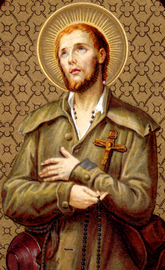Lives of the Saints
Our Models and Protectors
Spiritual Bouquet:
April 16

Saint Benedict Joseph Labre
Mendicant, Pilgrim
(1748-1783)
Saint Benedict Joseph Labre was born in the village of Amettes, near Boulogne in France, on March 26, 1748. He was the eldest of a family of fifteen children. From his earliest years he manifested exceptional piety, and was particularly attracted to the Blessed Sacrament of the altar. His early education was confided to one of his uncles, who was the parish priest of Erin, in view of his future ordination. He was not certain, however, that he was called to the priesthood, and said, It is very beautiful to be a priest, but I fear losing my soul while saving others. He desired the contemplative life and entered the Carthusian Order. But it was not long before his Superiors decided he did not have the vocation to that Order.
After making several more requests to enter monasteries where he might serve God according to his heart's desire, he was finally received in November 1769 by the Cistercians, whom he greatly edified by his silent prayer and communion with God. His happiness, however, proved to be short-lived; he was taken very ill and again his Superiors decided that he was not called to be one of their number. Providence had permitted these events. Upon his recovery, he discovered God's holy will for him, which was, he wrote, that remaining in the midst of the world, he devoutly visit as a pilgrim the famous places of Christian devotion.
With this purpose ever before him, he made solitary pilgrimages to many of the great shrines of Europe, taking with him only a rosary, a crucifix, and a little sack containing his New Testament, the Imitation of Christ and a Breviary. He visited the shrine of Our Lady of Loreto in Italy no fewer than ten times during his life.
One writer tells us that he seemed to have been destined by God to recall to men's mind the poverty of Christ. He ate nothing but the fragments he received from charity, and never kept any food given him for another day, becoming himself a provider for the poor with his surplus. He slept outdoors as a rule, and esteemed himself happy in suffering hunger, thirst, heat, rain, cold and snow. He was ordinarily regarded as a fool, and was often the brunt of mockery by children and bystanders. No mistreatment could discourage him, since he kept ever before his mind the mortified life of the Master and His Blessed Mother.
He loved most of all the Church of Our Lady of the Mountains in Rome. He spent much time in this, his favorite place of devotion, and on Wednesday of Holy Week in the year 1783, when he went to pray, he was taken suddenly ill, and expired while those who attended him in his last moments were saying the invocation of the litany of the dying: Holy Mary, pray for him.
Reflection. Let us learn from the life of Saint Benedict Joseph to remember that we are always in the presence of God, and particularly so when in church; for Jesus is really, truly, and substantially present in the Most Blessed Sacrament of the Altar.
Vie des Saints pour tous les jours de l'année, by Abbé L. Jaud (Mame: Tours, 1950); Lives of the Saints for Every Day of the Year. (Reprint of the work of John Gilmary Shea, with Appendix including recently canonized Saints) (Benziger Brothers: New York, 1955. Third Edition: Tan Books and Publishers: Rockford, Ill., 1995).